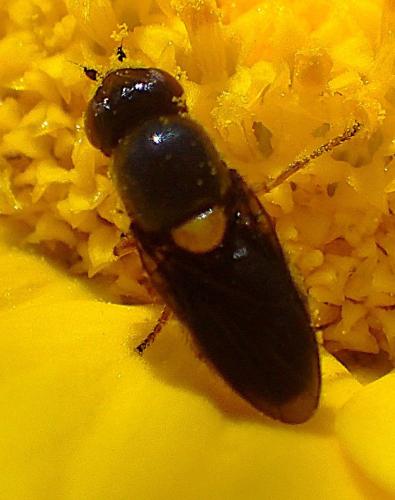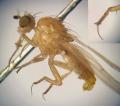Diptera.info :: Identification queries :: Diptera (adults)
|
[Capnoptera sp.] Chloropidae from southern France
|
|
| JC_Bartolucci |
Posted on 29-05-2025 08:46
|
|
Member Location: Posts: 122 Joined: 06.05.20 |
Hello, Sorry for the poor quality of the photo, but do you think it’s possible to identify this black fly with a yellow scutellum and dark wings? I think I can make out lighter stripes on the sides of the thorax, but I'm not sure.  JC Bartolucci : France : Saint-Laurent-d'Aigouze : 30220 : 17/05/2025 Altitude : NR - Taille : 6 mm Réf. : 359393 Thank you in advance! JC Edited by JC_Bartolucci on 31-05-2025 22:42 |
|
|
|
| Nikita Vikhrev |
Posted on 29-05-2025 14:14
|
|
Member Location: Moscow, Russia Posts: 9526 Joined: 24.05.05 |
It has non-Chloropid smell. May be something like Timia?
Nikita Vikhrev - Zool Museum of Moscow University |
|
|
|
| JC_Bartolucci |
Posted on 29-05-2025 21:38
|
|
Member Location: Posts: 122 Joined: 06.05.20 |
Thank you for your reply. I can't find almost anything on this genre. |
|
|
|
| Nikita Vikhrev |
Posted on 30-05-2025 12:00
|
|
Member Location: Moscow, Russia Posts: 9526 Joined: 24.05.05 |
https://diptera.info/photogallery.php?photo_id=4193
Nikita Vikhrev - Zool Museum of Moscow University |
|
|
|
| JC_Bartolucci |
Posted on 30-05-2025 22:16
|
|
Member Location: Posts: 122 Joined: 06.05.20 |
Thank you again, Nikita, for your suggestions and the helpful photo link. Without insisting on Chloropidae—and of course without ruling out your hypothesis—I was wondering if Capnoptera could be a possibility, at least based on general appearance (dark body, yellow scutellum, dark wings). I realize the photo is not ideal for identification, and it’s likely not enough to go further, but I’d be very interested to know if this genus might be worth considering. This specimen on Biodiversidad Virtual looks quite similar to mine. Edited by JC_Bartolucci on 30-05-2025 22:17 |
|
|
|
| Nikita Vikhrev |
Posted on 30-05-2025 22:36
|
|
Member Location: Moscow, Russia Posts: 9526 Joined: 24.05.05 |
As I wrote, I'm narrow or very general expert. https://diptera.info/forum/viewthread.php?forum_id=5&thread_id=72042 Capnoptera seems to me as good idea/ Nikita Vikhrev - Zool Museum of Moscow University |
|
|
|
| JC_Bartolucci |
Posted on 31-05-2025 21:45
|
|
Member Location: Posts: 122 Joined: 06.05.20 |
After some further research and comparison with available descriptions, I’ve taken a closer look at the three species listed in Archivum Zoologicum: C. scutata: short body hair, variable coloration from mostly yellow with black stripes to almost completely black; third antennal segment slightly longer than wide. C. pilosa: longer, somewhat shaggy hairs; dark body with dark reddish-brown areas; broad third antennal segment; clear median groove on the ocellar triangle. C. breviantennata: similar pilosity to pilosa but overall lighter yellow body; square-shaped third antennal segment with rounded corners; narrower, more pointed ocellar triangle. Given the limitations of the image (and I’m fully aware it's quite poor!), it’s hard to assess pilosity or precise antennal proportions. However, based on general appearance — dark compact body, dark wings, and yellowish scutellum — C. pilosa still seems to fit best. Interestingly, this species doesn't appear in the French INPN database, while the other two do. I'm reaching out to experts for confirmation, and I hope to revisit the site soon to try and collect a specimen under better conditions. Any feedback or correction is, of course, more than welcome! |
|
|
|
| JC_Bartolucci |
Posted on 31-05-2025 22:41
|
|
Member Location: Posts: 122 Joined: 06.05.20 |
Reply from Martin Ebejer : "You present an interesting problem. Colouration is a most unreliable criterion to differentiate these three species. With Capnoptera you need a very clear image of the frons to show the proportions and angles of the frontal triangle as well as the midline groove. You also need images to show the length and density of the setulae on the head and thorax , including the scutellum. Unfortunately, your photo shows none of these and so, as you guessed, it is impossible to give a species name with any certainty. I brought my own specimens out to see if I could see anything else that might help. But no luck." |
|
|
|
| Jump to Forum: |












